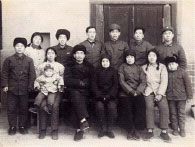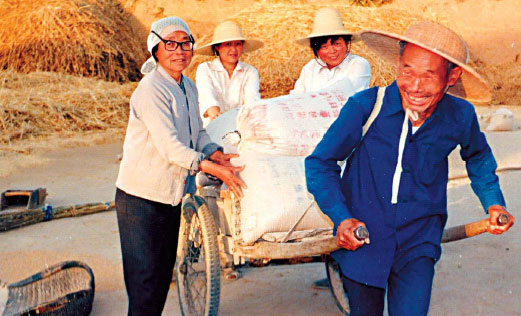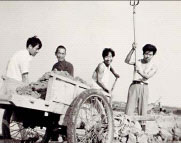In the name of the father
Four generations under one roof: Hou Yonglu (seated second from left) with his family during the Spring Festival in 1979. |
A junior high student and teachers college drop-out, the peasant boy kept writing diaries all his life until the Spring Festival in 2005 when he suffered severe ailments.
"Over the past six decades, my grandpa has written at least 2 million words in his diaries," said Hou Liang, 26, from the remote Lujing Township of Northwest China's Shaanxi Province. "And like a miracle, most of these documents survived various kinds of social changes in the local communities."
Hou's early memory of his grandpa is closely associated with his neatly stockpiled diary books. They are various sizes and colors and are still kept in his bedroom in their old house in Luyi Village.
A photo taken in 1994 shows Hou Yonglu, then 63, collects wheat on the sunning ground along with his wife Zhao Julan and daughters-in-law. |
"But it was not until his departure some two years ago did I realize that all his writings, just like his remarks on his sick bed, were such an invaluable legacy for my family," said Hou, now a post-graduate with scriptwriting department of the Beijing Film Academy.
The 26-year-old film-maker has published part of his grandfather's diaries in a new book entitled A Chinese Peasant's Diaries.
"Reading a few pages, I was deeply impressed by the diligence and perseverance of the 74-year-old farmer," said Xie Ciyi, editor for the book, who was offered photocopied samples of the diaries about a year ago.
Personally moved by the content of the diaries, Xie, however, was still worried about the book's marketability until an interesting event at a bus station changed his mind.
"A young man standing beside me was accidentally drawn to the diaries. He read a few pages over my shoulders until I left," she recalled.
"It suggested to me that people would be interested in the book."
A photo taken in 1980 shows Hou Yonglu works with his sons for an irrigation project in Lujing Township of Northwest China's Shaanxi Province. |
"I was moved to tears when I read through the book," Tan Chuanbao, a professor with the Beijing Normal University told China Daily. "Hou's honest and simple accounts of a changing rural China and his family history remind me of my rural life as a teenager," said Tan who is specialized in education science.
"I have recommended this book to many of my students and colleagues. For me, it provided a plain looking but engrossing and little known account about rural China. Frankly, the book has changed some of my views about Chinese farmers."
Rural China and future of Chinese farmers have been hot issues in recent years. But the views previously voiced by film-makers, scholars and writers are somewhat different from the real picture.
Hou's book is a rare, timely, complementary document from the grassroots level, according to Liu Yibing, a veteran screenwriter and professor at the Beijing Film Academy.
Liu admits movies themed about rural China have been elbowed out by big-budget blockbusters in recent years and the life of the majority of Chinese people in the countryside are largely ignored by artists today.
News of the book has travelled overseas. "It is good to learn of the publication of Hou's diaries Clearly Hou Yonglu was an unusual individual and I hope that his diaries bring out the many and varied dimensions of rural life in his Shaanxi village," Mark Selden, a history professor with Cornell University told China Daily. "I believe it is true that this could be among the most important statements available in the unmediated words of Chinese villagers."
"We do have a number of villagers' accounts of their lives in the form of interviews and even biographies as recorded by Chinese and foreigners.
"But no book, to my knowledge drawing entirely on diaries," added the historian who has written several books about China including Yenan Way in Revolutionary China and Revolution, Resistance and Reform in Village China.
Yi Dajing, a book critic from Guangdong Province, wrote about Hou in his blog: "Although the diaries have been trimmed and polished awkwardly by the editor, I strongly believed time will prove the immeasurable value of the huge amount of raw data and realistic accounts of rural living contained in Hou's diaries."
Hou Shengtian, 53, the eldest son of Hou Yonglu, is a headmaster at a senior high school in a small city in Shaanxi Province. He said the book reveals only a small part of his father's life. "Although only one-tenth of his diaries have been made public, I think the readers can still learn a lot of facts about the life of the farmers in my home province," he said.
Hou said his father, besides farming, also served as a primary school teacher, village accountant, barefoot doctor, village head, and volunteer newspaper deliverer for 18 years.
Apart from diary extracts, the book is filled with memorabilia: vintage posters, tickets, food coupons, farming implements, photocopies of Hou's diary pages, children's songs, New Year couplets, folk song lyrics, as well as poems and essays created by Hou, and old family photos. According to Hou, his father accumulated a large number of books. "When I was young, my father often read out the books to me and my sisters and brothers by the side of an oil lamp. It is because of this reading session by the oil lamp that led me to passion for Chinese classics," said Hou.
"My father's diary is like a gold mine. I believe each reader may learn something from it," said Hou Zhengsheng, the fourth son of Hou Yonglu.
("A Chinese Peasant's Diaries," by Hou Yonglu, China Youth Publishing House, December 2006, 28 yuan)
(China Daily 04/13/2007 page18)

















